Quick read
- Research shows the effect of reviews on hotel conversion rates and pricing is massive with travellers four times more likely to pick a property with better reviews. Response timing, the amount you respond and the soothing words of a manager can make all the difference.
- Stay on top of things via your PMS with 5 lesser known KPIs to track guest sentiment.
- Set up a foolproof action plan (6 points) for dealing with negative reviews and to turn things to your advantage in the future.
Any seller of a product or service dreads the inevitable moment a negative online review appears on the horizon. For hoteliers, it’s often reason enough for the panic button to be pushed and for knee-jerk ‘fight or flight’ responses to click into action. But it need not be. Guest feedback aficionados TrustYou remind us that, on average, 85% of reviews are positive compared to 15% negative. So don't panic if you get a negative review - nobody is perfect and having an unblemished score is unrealistic.
For something so ostensibly qualitative like a review, we wanted to find out if there was a way to turn guest feedback into actionable data our hoteliers could use. After all, harnessing data for efficient use is one of the main reasons the Mews Commander PMS came into being in the first place…
What is the effect of reviews on hotel conversion rates and pricing?
Fortunately, our friends at TrustYou have a similar obsession with data and have crunched the numbers for us in their recent research with NYU. In short, the effect is massive.
"As the volume of reviews continues to rise, user-generated-content becomes increasingly important in travellers’ booking decisions. When holding prices constant, travellers were nearly four times more likely to book a hotel with higher reviews.
When presented scenarios in which hotels with higher review scores also had higher prices, travellers still indicated that they are more likely to book the hotels with the higher review scores.
Furthermore, when explicitly asked about an increase in pricing, 76% of travellers reported that they would be willing to pay more for a hotel with a higher review score.”
What does this all mean in layman’s terms? It means hoteliers that focus on online reviews stand to drastically increase revenue. Not only will your conversion rates increase but the findings suggest you may also be able to raise your pricing without breaking a sweat.
A separate study by Cornell University in 2016 entitled ‘Hotel performance of socially engaging with consumers’ gave a more nuanced analysis. First, the study found that simply encouraging reviews was associated with an increase in a hotel’s ratings. Remember that guests can already see all your reviews online so being guarded will only increase the trust deficit between you and customers. Second, the research concurred that hotel revenue levels increase as the number of responses increases, but only to a point. After about a 40-percent response rate, hotels seem to reach a point of diminishing returns, and making too many responses is worse than offering no response at all. Finally, the report highlighted that consumers seemed to be the most appreciative of responses to negative reviews.
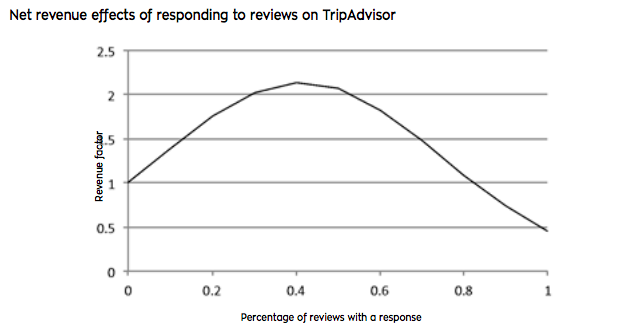
So it’s clear that encouraging reviews and responding to them are important, up to a point, and that focusing on responding to negative ones particularly resonates with consumers.
Consider that TripAdvisor specifically reveals that their Popularity Index algorithm is based on three key ingredients:
1. the quality, or average rating, of your reviews
2. the quantity of your reviews
3. the recency of your reviews
The majority of TripAdvisor users (79%) will read at least 6-12 TripAdvisor reviews before choosing a hotel with the same amount saying traveller-submitted photos will swing their booking decision.
But what metrics should you start tracking through your PMS to stay on top of these sentiments?
5 review KPIs every hotel should track
Hotels will already be familiar with the usual key performance indicators (KPIs) for their properties (RevPAR, ADR, Occupancy Rates etc) but TrustYou thinks there are a handful of undervalued KPIs concerning guest perceptions that hotels should be adding to their dashboards and monitoring.
1. Overall Performance scores
This metric is calculated using a review algorithm that checks every review that has been posted about your hotel on the web and enables you to determine trends over time and how your property stacks up against competitors.

In the example above your score is improving while the competition are letting things slide…
2. Recommendation rates
This signifies whether or not a guest will return to your hotel again and how likely they are to recommend your hotel to others.

Here it looks like your hotel needs to get back on track and make some changes!
3. Sentiment scores
These are useful to understand what drives the overall scores and so you can zero in on the areas to improve. Although there are over 120 different categories to filter through, TrustYou have determined that ‘Food & Beverage’, ‘Front Office’, ‘Housekeeping’ and ‘Spa’ tend to be the key sentiment categories that hotels use to measure travellers’ opinions. It’s calculated by an algorithm that scans the reviews for comments like "my room was not properly air conditioned” and allocates an appropriate score.
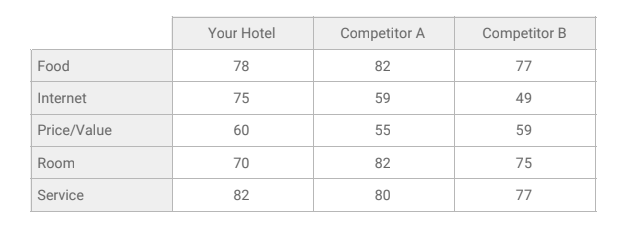
Here both ‘Room' and ‘Food’ are low in comparison to competitors and deserve more attention while 'Price/Value', ‘Internet' and ‘Service' are potential USPs and could be used for marketing for winning business from the competition.
4. Impact scores
For even deeper insights about what is impacting your hotel’s reviews, impact scores show you what needs to be addressed (or championed) at your property.
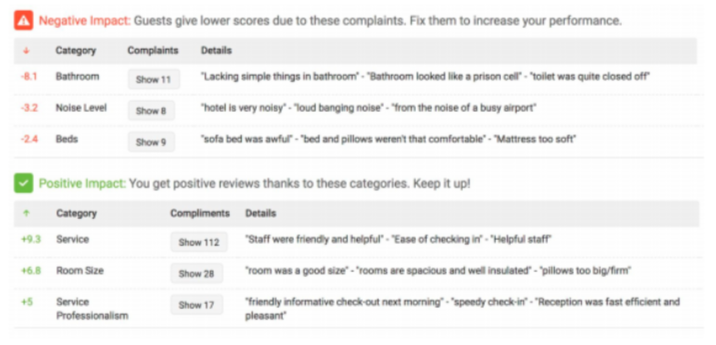
In the above example ‘Bathroom' and 'Noise Level' have a -8.1 and -3.2 impact on your hotel’s performance score and are the most influential factors in your negative reviews.
5. (Management) response rates
Research shows that managers who respond to reviews average a 6% higher review score compared to those that do not. TripAdvisor also revealed that 85% of their users say a good management response to a poor review improves their impression of a hotel. Enough said.
So, with TrustYou’s help, we have managed to convert a vital qualitative factor to your property’s success into something quantitative that we can monitor and visualise. So far so good. But here's the rub - not all feedback is positive. What should you do when that inevitable bad review rolls in and starts burning a hole in that online profile you have been nurturing so lovingly?
Here are some tips…
Build a fool-proof action plan
Write down or set up a fool-proof action plan so that any operations director has steps to easily remedy the issues. It’s all about implementing changes and communicating what those are to the guest.
1. Read the review and chase up the complaint to check if it’s valid.
2. Assuming it’s valid, first try improvise and get creative to put together a rapid remedy that won’t require large expenditures or approval.
3. Decide whether a more major change or fix may be required.
4. Respond to the review with our ‘sandwich’ approach and mention the solutions, both short-term and long-term, you are taking.
5. Listen to guests and keep the lines of communication open during the entire guest journey.
6. Incentivise your team to get personal mentions in positive reviews in the future.
Get creative and improvise quick remedies
First, be creative and agile to get quick fixes in place for the more trivial complaints. For example, if people tend to remark about the small closets in your rooms, why not pre-empt this and place little cards in the closets with a quirky note describing how the design of the rooms is to give you more living space at the expense of some closet real estate but that, should you need more storage, feel free to contact a specific person/number/email/social media handle.

Or if your property’s location is not exactly ideal and that is comes through in reviews, you could put together an itinerary of cool and lesser known things guests could do in the neighbourhood. Most people may not know about the excellent local coffee shop or nearby bike rental spot.
Response timing is crucial
Research has shown that the apology curve is U shaped. “Apologies that come too late, like those that come too early, are likely to fail; the sweet spot is somewhere between the two,” explained Cynthia Frantz of Oberlin College, who authored a landmark study on apology timing titled “Better Late Than Early.”
Apologies are both art and science and it all starts with the timing of the first response. Bill Clinton’s fumbled and drawn out apology for his infamous affair with Ms Lewinsky is a case in point. On paper, Clinton’s words appear contrite and confessional in his final public apology after several duds. Yet nearly two decades later, many who study the psychology of apologies view the address as a four-minute primer on how not to apologize for something.
Kill them with kindness
Be kind in your response. The reviewer may appear to be livid but they have also taken the time out of their busy day to actually pen a review, albeit negative. So get the ball rolling by thanking them for taking the time and for offering their insights. Remember, be genuine about the ‘thank you’. Negative feedback can always be looked at through a positive lens as, in most cases, it signals real issues and most of them are mendable.
Acknowledge and address the issues
Don’t be generic here - guests can smell a superficial response a mile away so be personable. That means using ‘I’ and not the royal ‘we’ as it will resonate more. Then investigate the grievance or problem to see if it’s actually valid. If it is - raise your hand and offer up the mea culpas. Own it. These days it seems not a week goes by when a public figure is not scrambling to apologise for a gaff they made concerning major societal issues. For an example of brilliant emotional intelligence and taking ownership of a mistake without any clever alchemy of words, look no further than Tony Robbins’s Twitter apology for his insensitive remarks regarding the #metoo movement.
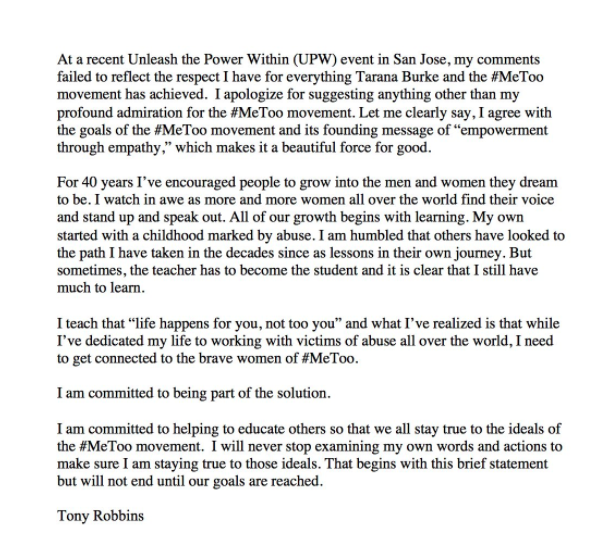
So try to make amends and then express explicitly to the guest what it is you are doing to solve it. They will always appreciate honesty and effort and, even though they may imply they are unsympathetic, they will know that imperfections are normal for any business. Assure the guest that necessary measures will be taken in the future.
On the other hand, if the complaint is unfair or related to something disconnected to your property, let them know in the nicest possible way. We live in a world where online trolls and cynical reviews are pervasive so thank them for their time, explain that it was not in your control and move on without losing any sleep over it.
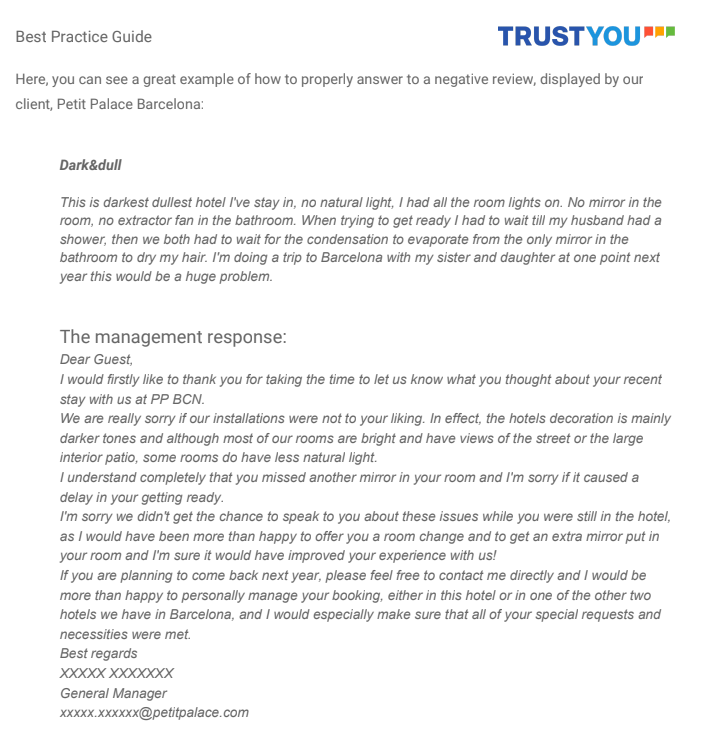
End on a positive note and invite the guest back
You guessed it - it’s the old sandwich approach. The secret is to start with something positive (thanking the guest), then address the negative (acknowledging the issues and trying to solve them ASAP) and then go back to the positive in order to end the reply on a good note. Do so by inviting the guest back for a future visit so that they get the chance to form a better opinion based on the improvements that they helped fix.
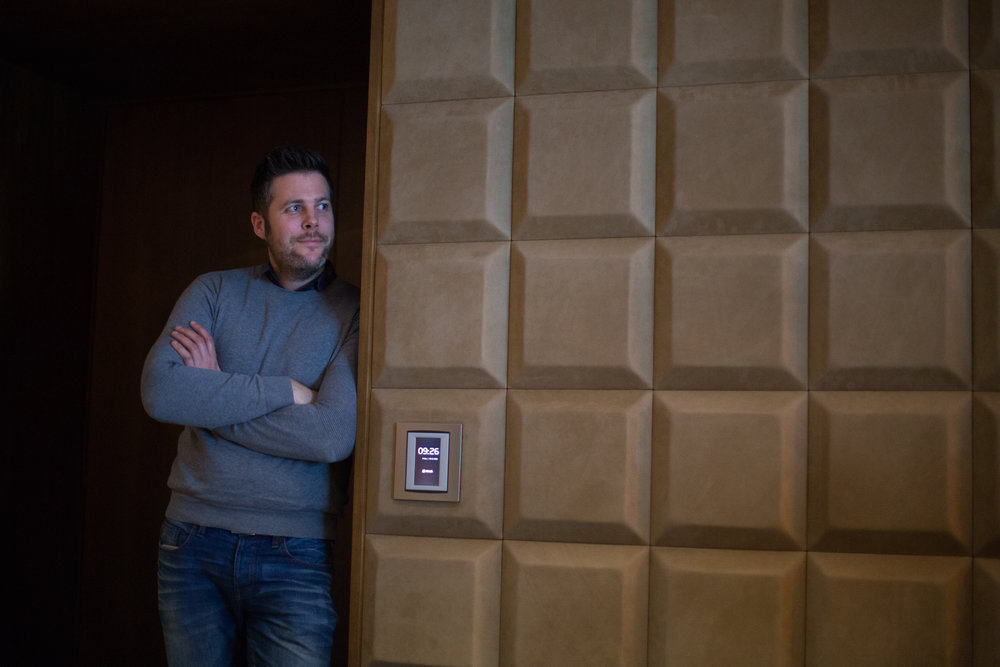
Also, zero in on the positive comments in the review. Most reviews will not be 100% negative so, if someone mentions in passing that they liked they pool, you could mention that you were "happy to hear you loved our outdoor swimming pool and sun terrace”, thereby turning it into a micro-marketing opportunity between the lines. Or be bold and try mention things in the hotel that could help offset the grievance, such as pointing out the amazing public living spaces with free drinks you have that could take the edge off the smaller rooms.
Finally, make sure to sign off the review with your name and an appropriate way for the guest to contact you. Or go the extra mile and give your personal email address! It shows that the hotel truly is interested in ensuring its guests have a great experience and that management have skin in the game when it comes to feedback.
Keep the lines of communication open during the entire guest journey.
We saw from the data above that encouraging feedback ultimately leads to more revenue for hotels so it goes without saying that you need to start with offering a slick guest feedback platform to capture sentiment in the most painless way possible. Benjamin Jost, CEO and co-founder of TrustYou, is leading the charge for feedback platforms. “Our new platform is the only all-in-one guest feedback solution that helps hotels to capture, analyze and market reviews, surveys and messages on every channel,” he confidently says.
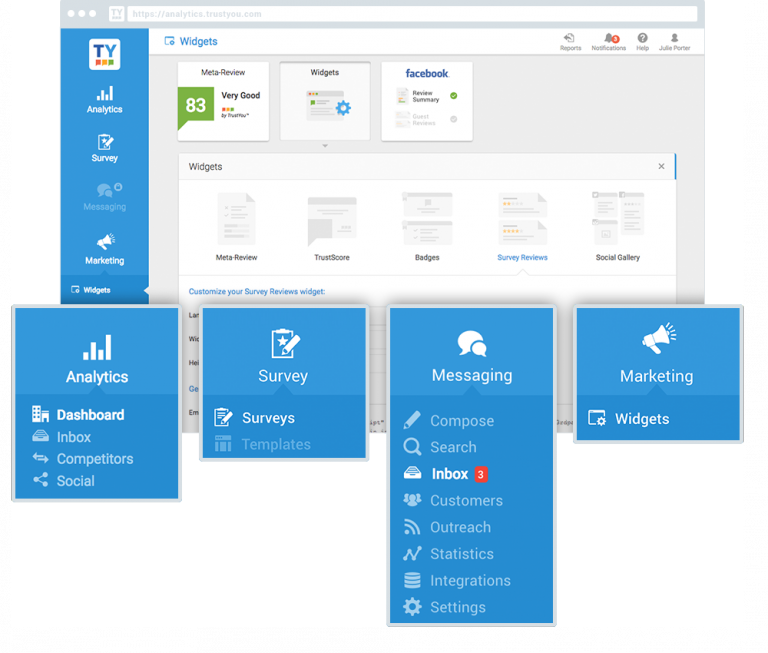
But there’s more. As we highlighted in our review of the top hotel trends for 2018, instant messaging with hotels is becoming the new norm. Answering queries via live chat will be key and it's best to plug in to the instant communication apps guests are already using.
Using new features like TrustYou Messaging allows you to avoid that unprofessional and antiquated back-and-forth with guests. By using messaging, hoteliers can not only interact with guests but also delegate tasks and properly divide them between staff members.
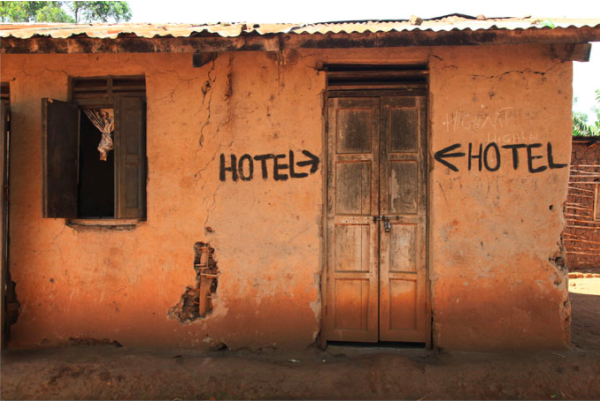
Incentivise your team
For an added bonus, aim to get your team mentioned in reviews. Perhaps even incentivise them with a cash reward of €50 if their name gets a positive mention in any reviews.
“What we did at the Emblem Hotel in Prague was a twist on the name tag, which included a hashtag describing something that team member was passionate about and it created a talking point. For example, our social media manager was ‘#FuturePulitzerWinner’,” says Mews CEO Matthijs Welle and ex-hotelier.

2026 Hospitality Industry Outlook
Download now
Table of contents
Hospitality hot takes straight to your inbox

.jpg?width=624&height=555&name=GLAMPING%20(1).jpg)
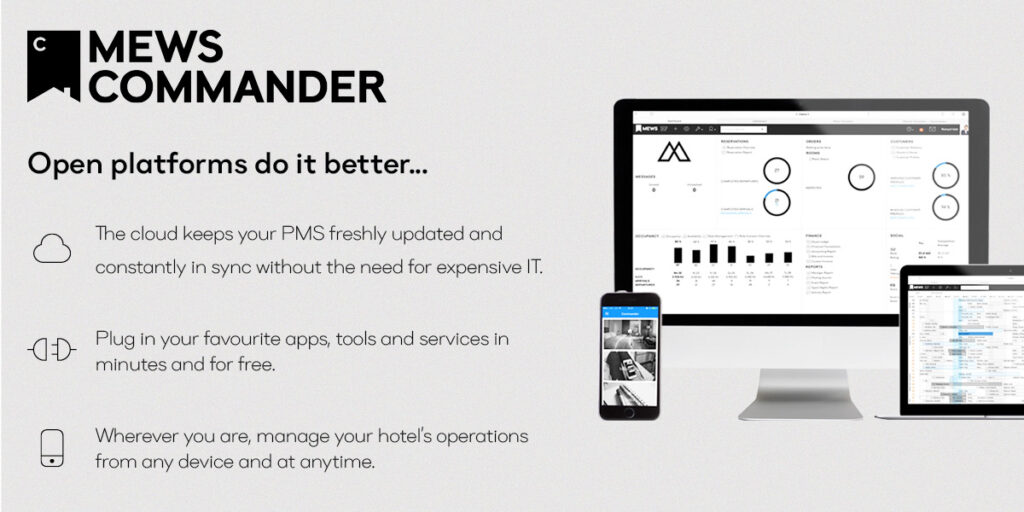



.webp)